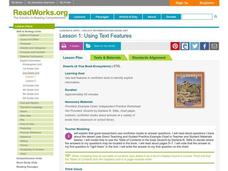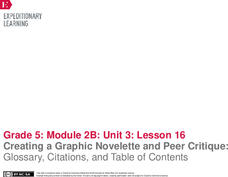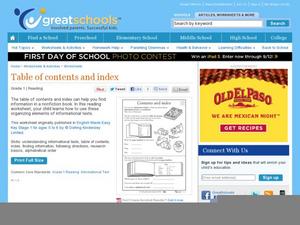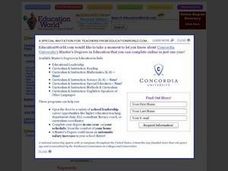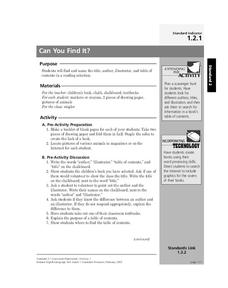Curated OER
Nonfiction Books: Table of Contents and Index
How do you find what you're looking for when reading a nonfiction book? Even first graders can learn how to use a table of contents and an index. They use the provided images of each to locate information and answer nine questions.
Curated OER
Using Text Features
Investigate a "table of contents" with your students! They read the table of contents in Deserts by Darlene R. Stille and predict where the answers to specific questions might be found. Learners complete a worksheet in which they find...
EngageNY
Creating a Graphic Novelette and Peer Critique: Glossary, Citations, and Table of Contents
A, B, C ... let's alphabetize to get organized! Using the informative resource, scholars create an alphabetized glossary of key words for their graphic novelettes. Additionally, they create a table of contents and citations page.
Curated OER
Using a Table of Contents
While simple, this resource would be a great way to introduce your class to the use of the Table of Contents. It provides a step-by-step explanation describing how to find information. A teacher could supplement this presentation with...
Curated OER
Contents and Index
It's important for your readers to understand features of informational text such as index and table of contents, so give them this visual activity to get started. They read a brief explanation of informational text, then look at an...
Teacherfiles
Portfolio Contents
Learners can create a portfolio in any class and use this handy table of contents to organize their work effectively. Individuals are asked to include their best work alongside work that demonstrates areas for progress. The table of...
Curated OER
Table of Contents
In this table of contents worksheet, students read information about the table of contents and use a practice example to answer questions. Students answer four questions using the table of contents.
Curated OER
Introduce: Comprehension Monitoring using About Trees
As scholars begin reading more difficult text, they need to acquire an arsenal of comprehension strategies. Here are few helpful ones to guide new readers through the informational text About Trees, which is linked here for printing....
Curated OER
"Me" Resource
Learners elucidate themselves by writing up to six entries in different formats. Some formatting choices include a dictionary, encyclopedia, or atlas entry, a magazine article, a newspaper article, and a table of contents. Some...
Curated OER
Can You Find It?
Plan a Parts of a Book scavenger hunt. Begin by giving your young adventurers a book, and asking them to find the title, author, illustrator, and table of contents. After a discussion of the purpose of each of these items, class members...
Curated OER
Periodic Table of Fun
Are you looking to put the fun back in the fundamentals of chemistry? Why not have groups create their own periodic tables of something (animals, food, music groups, etc.) practicing the organizational strategies used in the periodic...
American Chemical Society
Periodic Table Trends Activity
The term periodic in periodic table has meaning. Young scientists view a video to learn about the periodic table and then use the provided resources to create their own tables. They focus on patterns of the chemical properties of each...
Curated OER
Identifying Features of Nonfiction Text
Learners explore nonfiction text. They identify the cover, title page, and table of contents of a nonfiction book. Pupils work in groups to create a chapter for a nonfiction class book about heroes.
Curated OER
Review Parts of a Book
Begin the year with a review of the parts of a book. Exercises in the unit plan ask emergent readers to identify the information on the cover of a book and on the title page, to explain the purpose of a table of contents, and to describe...
Curated OER
Library Lesson Plan: Table of Contents
Third graders create a table of contents. In this library skills lesson, 3rd graders read Welcome to the White House and use the provided worksheet to create a table of contents for the book.
Curated OER
Using the Table of Contents
Students critique a table of contents to find information in a book. Students locate their text books and then locate the table of contents in each one. Students research purposes for the table of contents in books.
Curated OER
Glossary, Index, and Table of Contents
Fourth graders use two separate sources to learn about index, glossary, and table of contents usage. In this library lesson plan, 4th graders use two books, Learning About Weather with Graphic Organizers, and The World Almanac for Kids,...
Wordpress
Equation Table Graph
Your Algebra learners will appreciate this fabulous, two-page printable. The first page has a list of numbers that lead to the learners writing an equation in a cloud that represents these numbers, and then filling in a table, and...
Mathed Up!
Two Way Tables
When presented with categorical data, a two-way frequency table is a great way to summarize the information. Pupils organize categorical data using a two-way table, then use the tables to determine missing data and to calculate simple...
LABScI
Atomic Structure and the Periodic Table of Elements: The Secret Agent Lab
Food always gets attention! Model atomic structure using fruit loops to represent the subatomic particles. After building models, scholars create ionic bonds using their models. Finally, they use these concepts to create a periodic table.
Curated OER
Table of Contents and Index
Have your class investigate the use of a table of contents and index to find information. They identify characteristics of informational books and add them to a chart, then demonstrate how to use the index and table of contents by trying...
Curated OER
Reading Comprehension: History of the Periodic Table
Although the article that launches this lesson is about the history of the Periodic Table, the objective is reading comprehension. Using the eight-page informational text, learners answer five comprehension questions and craft one essay....
Curated OER
Chairs Around the Table
Youngsters become flexible problem solvers with this challenging lesson. If there are 24 square tables in a restaurant, how many customers can be seated at one time? They can use manipulatives or draw pictures to help them find the...
Utah Education Network (UEN)
Analyze Proportional Relationships and Use Them to Solve Real-World Problems
What proportion of learners will benefit from the lessons on proportional reasoning? Class members learn about proportional relationships, from unit rates to writing equations for proportional relationships. Then, they learn to use...



